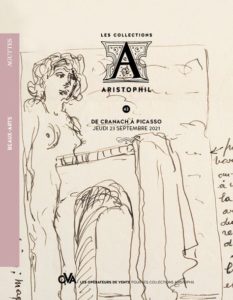DELACROIX Eugène (1798-1863). — L.A. (la fin manque), [forêt de Boixe] 4 octobre 1820, à son frère le Général Charles-Henri DELACROIX ; 2 pages in-4 (manque le dernier feuillet). — Il lui annonce que leur beau-frère VERNINAC ne pourra pas...
Description
Nous avons eu ensemble de très longues conversations à ce sujet. Quand au vin, c'est une autre affaire. Il le cherche ainsi que l'eau-de-vie et tu seras averti de l'époque à laquelle il faudra que tu envoies ton homme. À peine suis-je arrivé ici que j'ai vu par les conversations et autres choses qu'il y avait difficulté grande à débourser ou à embourser [...] Quel que soit l'embarras de Mr Delacroix, celui de Mr Verninac est plus grand encore. Depuis l'adjudication, il a été obligé de payer près de 40,000 F en droits d'enregistrement, frais de palais et engagemens à temps contractés pour la succession. Lorsque l'ordre entre les créanciers de la succession sera réglé par le tribunal, il aura plus de trois cent mille F. à leur payer. Les ventes qu'il a pu effectuer jusqu'à ce jour et dont le produit reste dans les mains des acquéreurs, pour être compté aux créanciers, ne dépassent guères soixante mille francs. Quant aux revenus de la propriété, ils ont été insuffisans chaque année, pour faire face aux intérêts des sommes dues, au paiement des contributions, au salaire des gardes, à l'entretien du mineur et autres frais indispensables, comme procès à soutenir, entretien des bâtiments &c. [...] Il doit t'être bien dur dans ta position de ne pas voir de ressources t'arriver de ce côté. L'enregistrement quand même tu pourrais te procurer du fonds maintenant ne te servirait de rien, puisque par l'ordre qui va être établi entre les créanciers, toutes ces bouches vont s'ouvrir pour être payées de leur capital. [...] Ma soeur m'avait parlé dans une conversation d'une somme de 24.000 que le Prince [Eugène de Beauharnais] avait autrefois donnée à chacun de ses aides de camp en les mariant, de laquelle somme il aurait employé 16.000, à payer ou racheter une partie des effets de ton mariage manqué. Ce serait donc 8.000 encore et non pas 6.000 que le prince pourrait très légitimement appliquer à tes dettes, en y comprenant encore ce que nous avions trouvé ensemble, équipages, dettes des officiers italiens &c.»...
Lettres intimes (XLV, p. 183).
L.A. (end missing), [forest of Boixe] 4 October 1820, to his brother General Charles-Henri DELACROIX ; 2 pages in-4 (last leaf missing). — He tells him that their brother-in-law VERNINAC will not be able to send "any money this year. We have had very long conversations together on this subject. As for the wine, it is another matter. He is looking for it as well as the brandy, and you will be warned of the time when you must send your man. As soon as I arrived here, I saw from conversations and other things that there was great difficulty in disbursing or paying [...] Whatever Mr. Delacroix's embarrassment may be, Mr. Verninac's is even greater. Since the auction, he has been obliged to pay nearly 40,000 F in registration fees, court fees and time commitments contracted for the estate. When the order between the creditors of the succession is settled by the court, he will have more than three hundred thousand francs to pay them. The sales which he has been able to carry out up to this day and whose proceeds remain in the hands of the purchasers, to be counted to the creditors, hardly exceed sixty thousand francs. As for the income from the property, it has been insufficient each year to cover the interest on the sums owed, the payment of contributions, the salary of the guards, the maintenance of the minor and other indispensable expenses, such as legal proceedings, the upkeep of the buildings, etc. [...] It must be very hard for you in your position not to see any resources coming your way. Registration, even if you were able to obtain funds now, would be of no use to you, since, because of the order that will be established among the creditors, all these mouths will open to be paid from their capital. [...] My sister had spoken to me in a conversation about a sum of 24,000 which the Prince [Eugene de Beauharnais] had once given to each of his aides-de-camp when he married them, from which sum he would have used 16,000 to pay or buy back part of the effects of your failed marriage. It would thus be 8,000 again and not 6,000 which the prince could very legitimately apply to your debts, including what we had found together, crews, debts of the Italian officers &c."... — Lettres intimes (XLV, p. 183).




